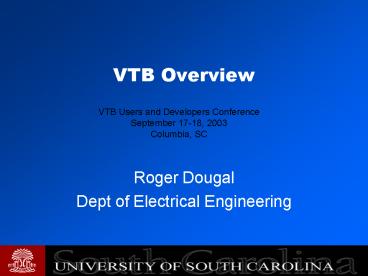VTB Overview PowerPoint PPT Presentation
1 / 16
Title: VTB Overview
1
VTB Overview
VTB Users and Developers Conference September
17-18, 2003 Columbia, SC
- Roger Dougal
- Dept of Electrical Engineering
2
A New Perspective
This is a gathering of many experts from many
disciplines who have worked together to create
and use the VTB software. VTB now transcends
any one research program. Contributions to its
technology and implementation come from many
directions and from many projects. It
ubiquitously appears in an ever increasing
spectrum of research endeavors. Our focus in
this conference is on the software itself and how
it can be usefully applied, rather than on any
one of the myriad of projects that use it or help
to develop it. You are welcome to contribute
knowledge and resources to further advance its
capabilities.
3
The VTB community
Consortium Core Partner Partner via
Subcontract Joint proposals Joint
projects Informal (unfunded) teaming Funding
agencies
SimSmart
Univ of Cambridge
Northeastern
University of Milan
MIT
Milan Polytechnic
Brown
UC Chico
FH
ONR
NRO
Barron Assoc
Army
Taganrog St Univ(Russia)
International Rectifier
Mississippi State
ABB
Univ Texas
SAIC
Arizona St U
Omni Power Technologies
Interactive Data Visualization
Univ Arkansas
Univ Puerto Rico/M
Florida State
Northrop Grumman Ship Systems
4
VTB Goals
- Develop the worlds most capable, flexible,
applicable, simulator for interdisciplinary
dynamic systems - Provide an interactive, immersive, realtime,
adaptable simulation environment that is
supported on many platforms - Support top-down design approaches, accounting
for parameter uncertainty, partial data, complex
multiresolutional models, many model tools - Support incremental virtual prototyping via
hardware in the simulation loop
5
Concepts of model resolution
Physical Process Resolution (more information)
Cross-disciplinary effects
Second order effects
First-order
Behavioral
Static
0-D
1-D
2-D
3-D
Spatial resolution (more information)
AC Steady-state
Lumped parameters
Distributed parameters
Switching average
Switching detail
Computational
Time resolution (more information)
6
Dynamic Model Order
Physical Process Resolution (more information)
- Higher resolution model
- Slower execution
- Detailed model knowledge required
- Detailed performance revealed
- Low resolution model
- Fast execution
- Partial model knowledge
- Partial performance revealed
Static
0-D
1-D
2-D
3-D
AC Steady-state
Lumped parameters
Distributed parameters
Switching average
- Users need variable model order
- During design
- During analysis
Switching detail
Computational
Time resolution (more information)
7
Multidisciplinary models
Electrical Terminals
Natural Port Across Voltage (V)Through Current
(A)
Natural Port Across Voltage (V)Through Current
(A)
Fuel Inlet
Air Inlet
Natural Port Across Pressure (Pa)Through Mass
flow (kg/s)
Natural Port Across Pressure (Pa)Through Mass
flow (kg/s)
Signal Port, Array type Fractional Concentrations
(kg/kg) Incoming heat content (J/kg)
Signal Port, Array type Fractional Concentrations
(kg/kg) Incoming heat content (J/kg)
Fuel Outlet
Air Outlet
Thermal Connection
Natural Port Across Temperature (C)Through
Power (W)
Fuel Cell
8
New Capabilities
- Scripting
- introduces concept of two separate time
references to trigger events - Programmable via Excel spreadsheet
- Modular solver for natural/signal systems can be
used under Windows, Linux, Mac OS-X, including RT
(not all cases) - System synthesis tools
- Analysis tools
9
Example Applications
10
Interactive dynamic simulation of a fuel cell
powered HMMWV
11
Highly multidisciplinary structure of a fuel cell
powered hybrid electric vehicle
H2 storage - metal hydride
Motor Drives
Advanced Machines
Lithium Battery
PEM FC
Thermal/fluid devices
Capacitors
Mechanical System
Power Electronics
Control Algorithms
12
Probabalistic load model
Model is programmed directly from an Excel
spreadsheet
13
Electric Aircraft
Virtual Test Bed 2003 - the world's most advanced
capability for virtual prototyping of advanced
power systems
X-Plane 6.7 - the world's most comprehensive,
powerful flight simulator, and has the most
realistic flight model available for personal
computers _____________________ Source X-Plane
web-site
Propeller hub mates torque and speed with X-plane
aerodynamic model
Cosimulation interface via network connection
yields fly-able model
14
Power management in a fuel-cell-powered battery
charging station
Each battery is 4 series Li-ion cells1.5 A-hr
25-cell PEM fuel cell stack
Random initial states of charge
Simulink co-simulation
Charge Controller
Charge Controller
15
Migrate to actual hardware
Estimated and Actual States-of-Charge
Actual SOC from battery model
Fractions of Total Depth-of-discharge
SOC00.6
SOC00.5
SOC00.4
16
Thermal coupling between metal hydride and PEMFC
Sophisticated models of electrochemical system
components allow detailed study of coupling
phenomena

